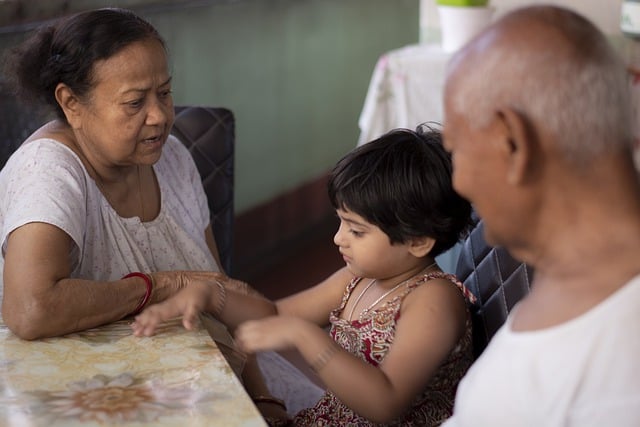Grandparents seeking their legal rights in Oregon must understand the state's family law framework and court system. This involves filing petitions or motions in District Courts for initial hearings on custody, visitation, and support. Through legal briefs, evidence, and arguments, a judge decides based on the child's best interests and grandparent-child relationship. Consulting an attorney, gathering essential documents, and demonstrating fitness are crucial steps to navigate the probate or circuit courts effectively. By mastering this court process, grandparents can protect their bond with grandchildren in Oregon.
Exploring the Oregon court process regarding grandparent legal rights can be intricate, but understanding the system is crucial. This comprehensive guide navigates the legal landscape for grandparents seeking access and rights to their grandchildren. From understanding the Oregon court system to initiating a case, we provide insights into the step-by-step court process, ensuring you know your entitlements. Learn how to gain legal standing, access resources, and advocate effectively for your grandparent rights within Oregon’s legal framework.
- Understanding Oregon Court System: An Overview for Grandparents
- Initiating a Case: What Every Grandparent Should Know
- Legal Standing and Eligibility to Seek Rights
- The Court Process Step-by-Step: A Guide for Grandparents
- Grandparent Rights: What You're Entitled to in Oregon
- Resources and Support for Navigating the Legal System
Understanding Oregon Court System: An Overview for Grandparents

Understanding the Oregon Court System is a vital step for grandparents seeking to navigate their legal rights within the state’s family law framework. The court process in Oregon is designed to ensure fairness and justice for all involved parties, including grandparents fighting for access to their grandchildren. This system operates through a series of courts, each with specific jurisdictions, focusing on family matters such as custody, visitation, and child support.
Grandparents interested in exercising their legal rights should familiarize themselves with the Oregon District Courts, which handle initial hearings and trials related to family issues. The process often begins when a grandparent files a petition or motion, outlining their request for specific grandparent rights, such as regular visitation or temporary custody. Court proceedings involve legal briefs, evidence presentation, and arguments from both sides, ultimately leading to a judge’s decision that considers the best interests of the child while also recognizing the significance of grandparent-grandchild relationships.
Initiating a Case: What Every Grandparent Should Know

Initiating a case to establish or protect grandparent rights in Oregon involves understanding the state’s court process. The first step is to consult with an attorney specializing in family law, who can guide grandparents through the legal landscape and help determine the best course of action. In Oregon, cases related to grandparent rights are often heard in probate or circuit courts, where a judge will consider evidence presented by both parents and grandparents to make a decision in the child’s best interest.
Grandparents should be prepared to gather essential documents, such as birth certificates, court orders, and any existing agreements regarding custody, to support their case. They must also demonstrate a legitimate reason for intervention, whether it’s due to a breakdown in communication between parents or a desire to maintain a significant relationship with the grandchild. Navigating the Oregon court process requires patience and persistence, but with legal assistance and a clear understanding of one’s rights, grandparents can effectively protect their bond with their grandchildren.
Legal Standing and Eligibility to Seek Rights

In Oregon, grandparent legal rights are a significant aspect of the complex court process involving family dynamics and relationships. To seek these rights, grandparents must first establish legal standing in the case. This means demonstrating a legitimate interest and connection to the grandchild that warrants their involvement in the legal proceedings. Understanding the criteria for legal standing is crucial when navigating the Oregon court process as a grandparent, as it determines their ability to actively participate and advocate for their relationship with the child.
The eligibility to seek grandparent rights often hinges on specific circumstances, such as the parents’ divorce, death, or incarceration, which may leave a gap in the grandchild’s primary caregiving system. Grandparents can petition the court for visitation or custody rights under these conditions, but they must also prove their fitness and ability to provide a stable and nurturing environment for the child. By understanding the legal process and requirements, grandparents can better prepare themselves to advocate for their role within the family structure, fostering a strong and lasting bond with their grandchild.
The Court Process Step-by-Step: A Guide for Grandparents

When a grandparent seeks to establish or protect their legal rights in Oregon, understanding the court process is essential. Here’s a step-by-step guide for navigating this complex landscape. The first step is to consult with an attorney specializing in family law to gain a clear understanding of your specific situation and available options. This lawyer can provide tailored guidance based on Oregon’s laws and help prepare necessary documents, such as petitions or motions, which are crucial for initiating the legal process.
Once prepared, these documents are filed with the appropriate Oregon court, typically the juvenile or family court. After filing, a hearing date will be scheduled where both parties—including grandparents and parents—can present their cases. During this hearing, the judge will review the evidence, listen to arguments from each side, and make an initial decision regarding custody or visitation rights. It’s crucial for grandparents to be proactive in gathering relevant information, such as medical records or educational reports, which can strengthen their case. Understanding the court process is key to advocating effectively for grandparent rights in Oregon.
Grandparent Rights: What You're Entitled to in Oregon

In Oregon, grandparent rights are protected by law, offering certain entitlements for grandparents who wish to maintain a significant relationship with their grandchildren. Understanding the court process is crucial when seeking legal rights as a grandparent. The first step involves familiarizing yourself with the Oregon court system and the specific laws pertaining to grandparental rights. This includes recognizing your right to seek custody or visitation, often through a petition to the court.
Navigating the court process requires careful consideration of various factors, such as the child’s well-being, existing family dynamics, and the grandparent’s role in the child’s life. By understanding your entitlements and the legal landscape, grandparents can ensure they are adequately represented during court proceedings, ultimately advocating for a positive outcome that allows them to maintain a meaningful connection with their grandchildren.
Resources and Support for Navigating the Legal System

Navigating the Oregon court process to assert or protect grandparent rights can be a complex and daunting task. Fortunately, several resources and support systems are available to help grandparents and families understand this legal landscape. Legal aid organizations, such as those affiliated with the state bar association, offer free or low-cost legal assistance for qualifying individuals. These services can provide guidance on court procedures, explain grandparent rights in Oregon, and even represent you in court if needed.
Additionally, local community centers, social service agencies, and non-profit organizations dedicated to family law often host workshops and information sessions covering various aspects of the court process. Attending these events allows grandparents to gain insights into their legal options, ask questions, and connect with other families facing similar challenges. Understanding the court process in Oregon is crucial for ensuring your rights as a grandparent are respected and protected throughout any legal proceedings.














